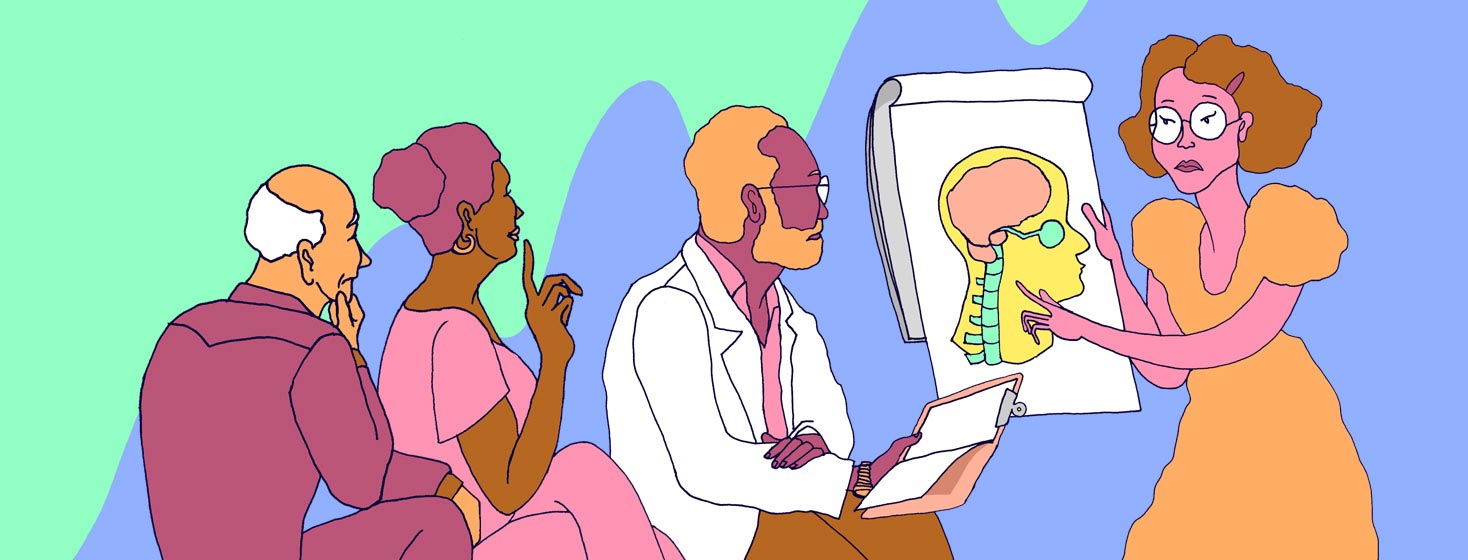The NMOSD Learning Curve: Navigating the Role of Patient and Educator
There is a seemingly never-ending learning curve that goes hand in hand with an NMOSD diagnosis. One of the most difficult aspects of living with NMOSD has been the process of accepting my life as it is today, grieving what I thought my life would look like before I got sick, and continuing to live the best life I can despite the challenges I face daily.
How my life has changed with NMOSD
New attacks alter my life in a different way than they ever have before, and finding my “new normal” isn’t as easy for me as it was in the beginning. I’d be lying if I said that this disease hasn’t turned my world upside down a time or two. I wish I could say the hardest part of living with NMOSD is living with NMOSD, but that has not been my experience. Equally as challenging as living with NMOSD has been the drastic change in dynamics between me and nearly every medical provider I’ve encountered since being diagnosed.
Navigating the role of patient and educator
Up until NMOSD came into my life, I had never been tasked with educating a physician about anything medically related. I always thought it was the responsibility of the degree-holding medical professional to do all the educating and not the other way around. But time and again, the rarity of NMOSD has made it impossible for me to seek medical attention without first educating and answering the questions of the medical professionals overseeing my care. For many physicians, I’m the first patient they’ve ever treated with NMOSD, and it’s likely I’ll be the last.
Confronting the rarity of NMOSD
When I was first diagnosed with NMOSD, I was stunned to learn that a disease that had completely wrecked my life was essentially unknown to most of the providers overseeing my care. NMOSD is my reality, so I tend to forget about its rarity until I’m face-to-face with a doctor who has no idea what I’m talking about. It can feel unsettling to know more about a disease than your own doctor does, but this is a prime example of the learning curve that comes with NMOSD. I am no longer “just” a patient.
Building a toolkit for self-advocacy
The notion that I would be responsible for pulling double duty as both the patient and educator to physicians and medical professionals prompted me to immerse myself in all things NMOSD. My neurologist was also integral to the learning process as he made suggestions about the language I should use to accurately relay information about NMOSD to a physician unfamiliar with this disease. The knowledge I obtained from my own research, coupled with the invaluable knowledge my neurologist offered to me, has allowed me to feel empowered in situations where I would otherwise feel incapable of advocating for my care.
What I’ve come to realize is that NMOSD is like an invisible stranger that tags along with me everywhere I go. Instead of expecting specialists and emergency room physicians to already know who and what NMOSD is, I anticipate that I’ll be making an introduction. Don’t get me wrong, just because I can hold my own in conversations with degree-holding medical professionals does NOT make the NMOSD introduction process easy by any stretch. Appointments that should be seemingly straightforward are easily complicated by the nuances that NMOSD creates.
With NMOSD, nothing is easy
Trips to the emergency room during an NMOSD attack have further proven that “easy” and “straightforward” can’t exist in the world of NMOSD. Sometimes, going to the emergency room feels more stressful than an NMOSD attack itself. Traumatic hospital experiences have played a large role in the trepidation and stress that I associate with emergency care. Doctors who hurt more than help add a tragic layer to the NMOSD learning curve that I wish were nonexistent. Sadly, I know I’m not alone in my pain. Many NMOSD patients have experienced similar or worse.
You'll always be your own best advocate
If you take nothing else from my words, please believe me when I say that you will always be your own best advocate. Nobody is going to care more about your health than you do. Get to know NMOSD and take time to educate yourself about your treatment options. Talk with your treatment team about how to navigate situations that require you to introduce NMOSD to a doctor overseeing your care. Ask as many questions as needed. Get in touch with your body, trust your instincts, and relentlessly pursue the best care available to you.
The NMOSD learning curve is steep. Be sure the information you are consuming is accurate and up to date.
What have you had to teach your doctors about NMOSD?

Join the conversation